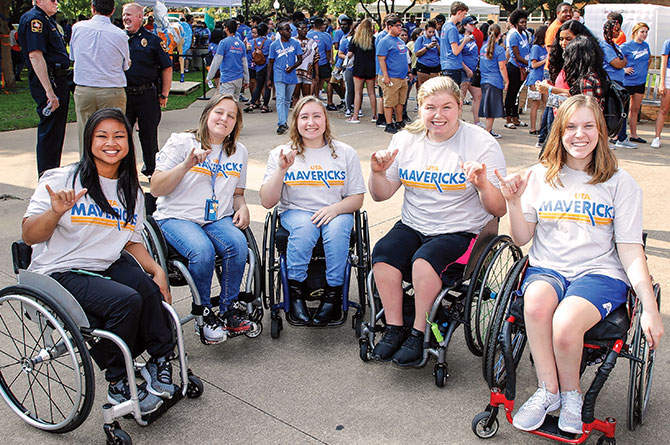At UTA, where health and the human condition is a key focus of our research initiatives, the development of impactful disability-focused programs has become a priority for researchers across the University. Their multidisciplinary, innovative work has resulted in statewide recognition for excellence and serves as a major contribution toward making the University the model barrier-free campus for Texas and the nation.
Last fall, four of UTA’s disability-focused programs received the Martha Arbuckle Award, which is conferred by the Texas Governor’s Committee on People with Disabilities each year. UTA’s disability studies minor, the Office for Students with Disabilities, the Movin’ Mavs Adapted Sports and Recreation program, and UTA Libraries’ Texas Disability History Collection received the prestigious recognition.
The interdisciplinary Minor in Disability Studies explores the experiences of people with disabilities—one of the largest minorities in the United States and worldwide—as well as the ways in which conceptions and representations of disability and “the normal” have shaped human experiences more generally.
The Texas Disability History Collection showcases Texas’ central role in the disability rights movement, especially adapted sports and access to higher education.
UTA’s Movin’ Mavs Adapted Sports and Recreation program provides sports and recreation programs and competitive athletic opportunities for students with disabilities. The Movin’ Mavs men’s and women’s wheelchair basketball teams have won a combined 10 national championships. Many individual players have gone on to compete and win gold for Team USA in the Paralympic Games.
“Being recognized by the governor is an enormous honor,” says Sarah Rose, director of the disability studies program and an associate professor of history. “So many great entities go into receiving this award. It recognizes UTA as a great academic destination for disability studies and as a great place for history.”
Health and the Human Condition
Global Environmental Impact
Sustainable Urban Communities
Data-Driven Discovery



